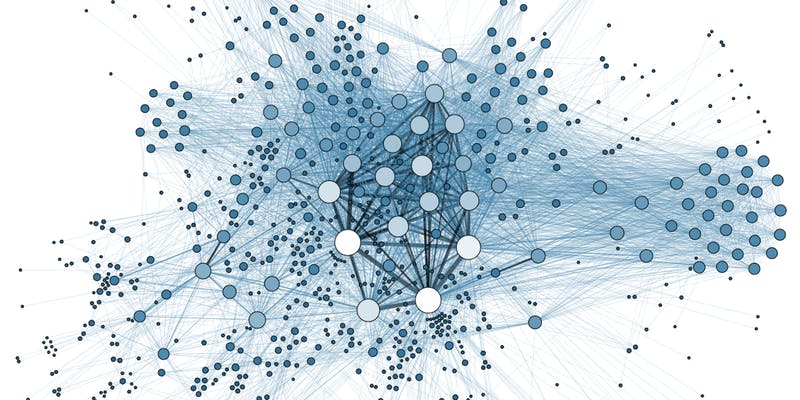[three_fourths]
Description
Public talk by Karin van Es, Daniela van Geenen and Maranke Wieringa (Utrecht Data School, Utrecht University).
Hosted by Jonathan Gray, Department of Digital Humanities, King’s College London. The hashtag for this event is #kingsdh.
The network visualizations humanities scholars and social scientists employ to communicate research findings are often imbrued with a sense of objectivity. The impression is that these visualizations show facts about, rather than interpretations of, data. Gephi is a popular network visualization package, and used widely within scholarly research. Problematically, it saves only the spatialized network graph, whilst the steps taken and parameters of the algorithms used to get to make the visualization go undocumented. To garner legitimacy for scholarship, it is important that the interpretative decisions involved in the construction of the visualization are documented and opened up for scrutiny. Presently, academic publications in the field of media studies offer limited transparency on the matter. In this talk we explore Gephi’s “epistemological affordances” and elaborate on how the interpretative acts of practitioners, knowingly and unknowingly, privilege certain viewpoints and perpetuate particular power relations. We subsequently present the ‘field notes’ plugin for Gephi developed in collaboration with the Digital Humanities Lab. It enables account-ability through the systematic documentation of the visualization and analysis process.
Speakers
Karin van Es is Assistant Professor of Television and Digital Culture at Utrecht University (NL) and coordinator of the Datafied Society research platform. Recent publications include the edited volume The Datafied Society: Studying Culture through Data (Amsterdam University Press, 2017) with Mirko Tobias Schäfer and articles for various journals and essay collections. Karin’s current work focuses on how datafication enfolds within public service broadcasting.
Daniela van Geenen is a lecturer in data journalistic research and data visualization at the University of Applied Sciences Utrecht and a researcher at Utrecht Data School. Her work tackles the question of the scholarly conduct that the work with digital methods demands, challenged by the need to design accountable software tools. Daniela published on the role of social and technical actors on social media platforms, and their meaning for social and political practices such as public debate and cultural consumption.
Maranke Wieringa is a lecturer at Utrecht University and a researcher at Utrecht Data School. She has a background in Cultural Studies and Media Studies, and specialized in software and data analysis. Notable research to which she contributed focused on how politicians, and actors operating at the fringes of the public sphere frame, and use, news (media). Maranke’s current academic work focuses on (scholarly and municipal) accountability in data projects.
[/three_fourths]
[one_fourth_last]
Date and time
19 June 2018
16:00 – 18:00
Location
K-1.56, King’s Building
Strand Campus, King’s College London
London
WC2R 2LS
[button open_new_tab=”true” color=”accent-color” hover_text_color_override=”#fff” size=”medium” url=”https://www.eventbrite.co.uk/e/the-field-notes-plugin-making-network-visualization-in-gephi-accountable-tickets-45237459459″ text=”Register” color_override=””]
[/one_fourth_last]

